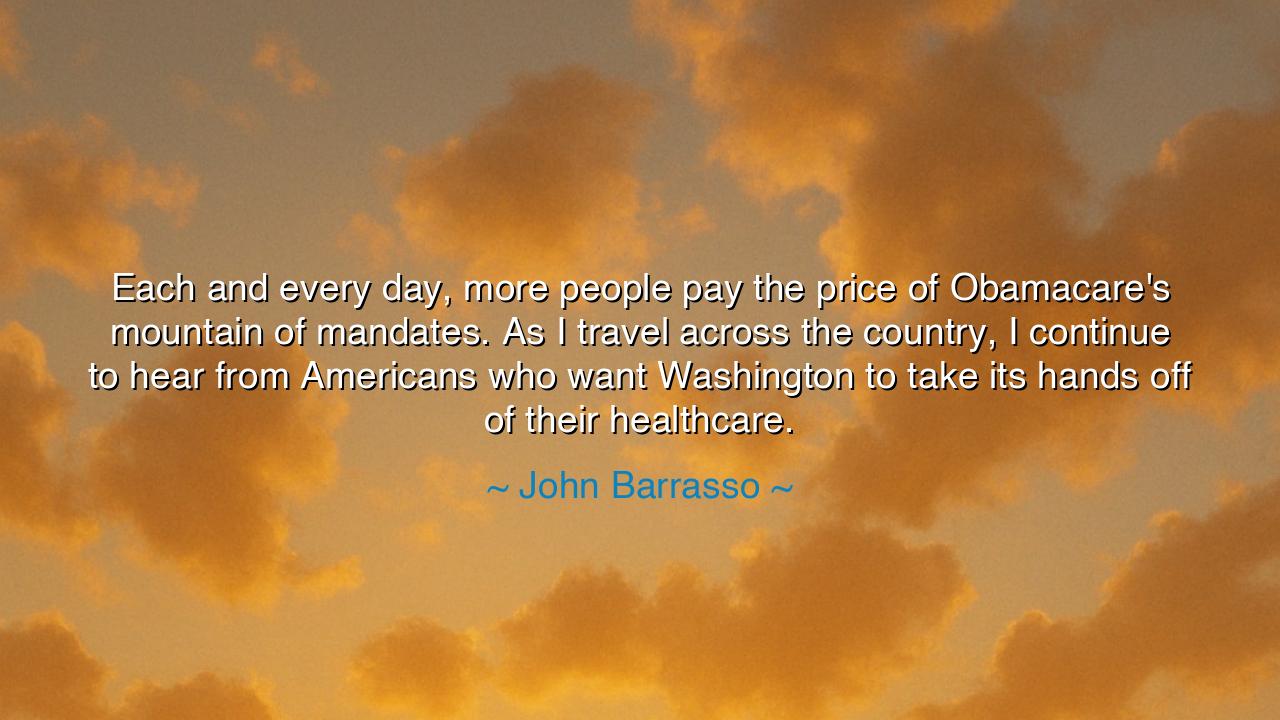
Each and every day, more people pay the price of Obamacare's
Each and every day, more people pay the price of Obamacare's mountain of mandates. As I travel across the country, I continue to hear from Americans who want Washington to take its hands off of their healthcare.






John Barrasso, physician and senator, once declared with urgency: “Each and every day, more people pay the price of Obamacare's mountain of mandates. As I travel across the country, I continue to hear from Americans who want Washington to take its hands off of their healthcare.” His words, sharpened by both his medical past and his political calling, speak to the deep tension between freedom and control, between the desires of individuals and the powers of government. In this saying, there lies a warning: that when the machinery of state grows too heavy upon the lives of the people, it burdens rather than liberates, and the cost is borne not only in coin but in spirit.
When Barrasso speaks of a mountain of mandates, he calls to mind the weight of laws and requirements that, though designed in the name of help, can crush under their sheer complexity. A mountain may inspire awe when gazed upon from afar, but for those who must carry its burden daily, it becomes toil and hardship. He tells us that ordinary people—farmers, workers, small business owners, families—are the ones made to bear this weight, and it is they who cry out for relief.
Yet his words are not simply complaint, but the echo of an ancient struggle. Throughout history, nations have wrestled with the balance between the guidance of rulers and the liberty of the governed. The Athenians in their assemblies, the Romans in their forums, debated these same tensions: how much authority is needed to preserve the common good, and at what point does authority become oppression? Barrasso’s voice belongs to this lineage, reminding us that even laws written with noble intent must be tested against the measure of human freedom.
Consider the example of the American Revolution, when colonists rose against the Crown. Taxes and mandates, some small in number yet heavy in meaning, became symbols of unwelcome control from afar. They were not rebelling merely against payments, but against the loss of choice, the sense that distant rulers had taken hold of their daily bread and labor. The cry of “No taxation without representation” was not about coins, but about dignity. Likewise, Barrasso’s warning points to the dignity of choosing one’s own path in health and life, without the constant intrusion of a distant authority.
His words also carry the perspective of a healer, one who has walked among the sick and broken. In saying “take its hands off their healthcare,” he reminds us that care is most sacred when it is personal—between doctor and patient, between families and their needs. When governments grasp too tightly, they risk transforming the healing art into bureaucracy, and the patient into a number upon a ledger. His cry, then, is not only political but human: to preserve the intimacy of care, the freedom of choice, and the trust of the individual.
But let us not mistake his message as a denial of the need for order. Just as in every society, some laws are necessary to bind chaos into harmony. The lesson lies in balance: too few protections, and the weak are left behind; too many controls, and the strong are shackled. True wisdom lies in finding that middle way, where law empowers without suffocating, where liberty breathes freely yet responsibility remains.
Thus, the teaching to future generations is this: guard your freedom carefully, even in matters where laws promise aid. Question whether the mandates placed upon you bring genuine justice or only added weight. Cherish the ability to choose in your most personal matters—your family, your work, your health—for once surrendered, such freedoms are rarely regained. And in your governance, whether of nations or of your own household, remember that good order should lighten burdens, not multiply them.
So, O listener, heed the voice of Barrasso: freedom must remain the cornerstone of care. The state may guide, but it must not dominate; it may aid, but it must not enslave. If the people lose the right to direct their own lives, then no law, however noble in word, can bring them peace. Seek always the balance where liberty and responsibility walk hand in hand, and in that path, you will find the truest health for both body and soul.






AAdministratorAdministrator
Welcome, honored guests. Please leave a comment, we will respond soon